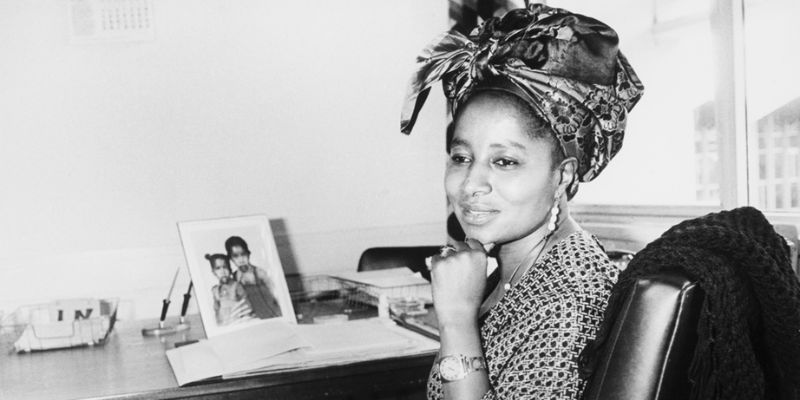
Image from The Elephant.
https://www.theelephant.info/reflections/2023/08/10/we-are-because-she-is-celebrating-micere-githae-mugo/
Firoze Manji[1]
How does one summarize in an article the breadth and depth of our reflections about and love for this exceptional woman, Micere Githae Mugo? It is a fitting tribute to her that the majority of comments on social media and elsewhere have taken the form of celebrating her contributions rather than shedding tears. These tributes are filled with joy at all that Micere contributed to our collective desire for justice, dignity and freedom that she inspired in so many of us. She wrote poetry, told stories, contributed to intellectual thinking, and accepted numerous invitations to speak — even until her last days. Her generosity of spirit and her willingness to have time for everyone, especially young people, was phenomenal. Where did this energy and passion come from? This was a woman who survived torture and imprisonment and eventually exile under the Moi regime. But far from having her spirit destroyed and becoming embittered, she responded with the invincible weapon of love, something that informed every aspect of her life.
The philosophy of utu / ubuntu was central for Micere: “we are because you are”. Yet for her, it was not so much an expression of a state of being as of becoming. As illustrated in The Trial of Dedan Kimathi, which she co-authored with Ngugi wa Thiong’o, colonialism tried to render our people as being less than human, those who could be imprisoned, tortured, locked into concentration camps and annihilated with impunity. The play showed how the struggles of the Land and Freedom Army, the so-called Mau Mau, were an assertion of our people’s humanity, an invention of what it means to be human, and as humans, always seeking paths for emancipation from all forms of oppression and exploitation. But for those who took over the colonial state at independence, who fed themselves on the fruits of uhuru, the play revealed the continuation of colonial forms of rule: the majority of impoverished people continue to be treated as less than human and, therefore, disposable. And when the play was performed to pan-African audiences at Festac ’77 and in Zimbabwe, this was too much for the new oligarchs who ran the country. Inevitably, the authors had to be stopped. Both were eventually forced into exile and stripped of Kenyan citizenship.
We celebrate Micere not merely as a Kenyan but as a pan-Africanist and as an internationalist. In exile in Zimbabwe, she saw the struggles of the freedom fighters there as a continuation of the universal struggle for justice, dignity and freedom in which she had participated in her native land. Her solidarity work with the struggles of Mozambique, Angola, Namibia, and South Africa was legendary. When in exile in the USA, she never missed an opportunity to speak out against imperial ventures of NATO and others while at the same time being courageous in denouncing the dictatorships that had emerged in the neo-colonies of Africa and the global South. She argued vehemently for what Michael O. West described as “the paramountcy of the soul over material accumulation. …[making] a stinging rebuke to capitalism, imperialism, racism, sexism, heterosexism and all the other antihuman -isms”. For Micere, her life’s work has been of universal significance — “I am a child of the universe,” she insisted.
She was gifted not only as a militant but also as an academic. She was a playwright, author, activist, instructor and poet. In exile in the USA, she became professor of literature in the Department of African American Studies at Syracuse University. She devoted her time not only to academic work but was also deeply engaged with the struggles of the local communities. She won numerous awards, and became known for creating “liberated academic zones” in which she challenged Western perceptions about knowledge, insisting that contributions of African thinkers and experiences of their struggles are of relevance for humanity not only for Africa alone. “In whose service are teaching, research work and publications by Africana scholars?” she asked. “… Is the knowledge they produce liberating and humanizing, or for the advancement of careerist ambitions?”
We had several exchanges during the last two years about Daraja Press publishing the book she was completing about one of the leading women leaders of the Land and Freedom Army, Field Marshal Muthoni wa Kirima. She wanted us to publish it in both English and Gikuyu. But a couple of months ago, she wrote to say that she no longer had the strength to complete the book. I hope that it might be possible to do so posthumously.
Micere had had to deal with her illness for some 15 years, although if you attended her numerous lectures or watched them online, you would hardly believe that she was suffering. She had extraordinary stamina and commitment to the causes she believed in. She was supported in doing so with the help and love of her oldest daughter, Mũmbi wa Mũgo who has been at her side to the end.
And in the course of her illness, Micere was devastated by the loss of her youngest daughter Njeri Kũi Gɩ̑thae-Mũgo who died from ovarian cancer in 2012. And in all her writings and speeches since, she dedicated her work to the memory of Njeri. In doing so, she helped keep the memory of Njeri alive by celebrating her daughter’s considerable achievements as an engaged intellectual and loving daughter.
It has been an honour to have worked with you, our sister, comrade, professor, Mwalimu Micere. We commit ourselves to continue your passion for the struggle for justice, dignity and human emancipation Because, Micere, we are because you are. We are becoming because you became.
July 2023
[1] Publisher, Daraja Press https://darajapress.com
This piece was first published by The Elephant (a Kenyan newsletter / website) on 10 August 2023. It is republished on our website with the permission of the author.
